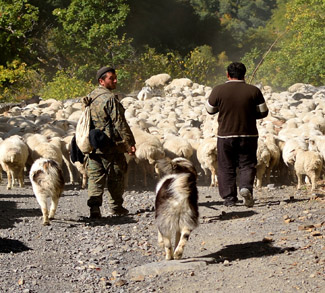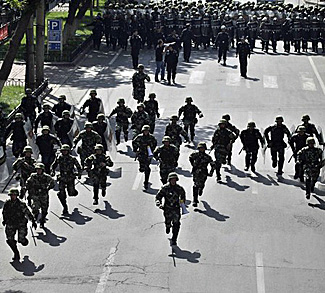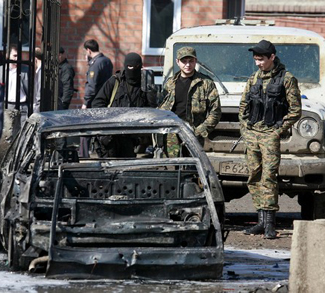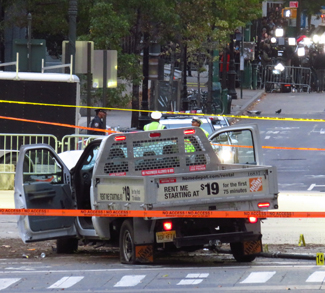“These Chechens… They are like wolves coming down from the mountains… I am afraid they will come after me,” the Turkish character of Vigo Mortensen’s Eastern Promises movie uttered. This brief yet strong statement concerning the imagination and representation of the Chechens as a wolf pack was what first intrigued me about the so-called Chechen warrior culture. Besides the reports of Chechens fighting in Ukraine and Syria, and now that we have recently read that Putin critic Boris Nemtsov was apparently murdered by Chechen hitmen, the Chechen warrior reputation will only prolong itself even further. In this opinionated article, I will briefly describe some anecdotes and stories while researching the warrior culture of three Russian republics (Ingushetia, Chechnya and Dagestan). However, I will limit this article to my experience with the Chechens, coupled with a few anecdotes – there are way too many stories to be shared that, unfortunately, this article would not be enough.
The Caucasus is one of the most diverse places in the world, both ethnically and linguistically. There is a story about Alexander the Great and The Caucasus. The story tells of the fierce resistance Alexander and his men faced while venturing in Vainakh (Chechen and Ingush) lands. Because of this, the Greeks, tired of fighting the Vainakh tribe, decided to turn around and march towards modern-day Dagestan – perhaps an explanation of why you find more tribes and diversity in Dagestan than the more uniform Ingush and Chechen clans. It’s also a potential explanation of why the Russian North Caucasus nations have been, throughout the course of history, more territorial than many other nations in the world, for history makes no distinction: you are either conquered and colonized, or you simply aren’t. The Ingush and Chechens, in reality, never were.
Each republic in the Russian Caucasus is as politically and culturally diverse as the other. The Ingush, for instance, though physically similar and ethnically related to the Chechens, have had different political problems, specifically stemming from land ownership and territorial boundaries with their Christian neighbors, the North Ossetians. And, well, Dagestan, I would describe it as the most diverse of all republics, from its landscapes and its peoples. Dagestan is a world of its own—with numerous ethnic groups and different idiosyncrasies (from Wahhabis to secular-inclined villages).
When I asked a Chechen highlander, in the breathtaking, mountain village of Tazbichi, about why the Chechens have historically fought the Russians for so long, he simply replied with a proud-looking face and a smile: “We are the sons and daughters of the mountains.” Not another word more, not another word less; only that profound statement. At first, I didn’t understood what that meant, but then I truly understood his meaning: this landscape, this environment, these mountains, what you see and feel, is and has been our home; we have lived and hunted in this land for hundreds of generations. The mountains are our family.
The question most likely, by now, you are probably wondering is: How did some guy from Guatemala end up in Chechnya?
Before telling you my story, first, I would like to ask you a few questions: Have you ever been curious about unusual, exotic, remote and untraveled landscapes? When you read the morning news about places that have been labeled as ‘failed states’, like Iraq, Somalia, Yemen, Afghanistan, and so on, yet despite how bad the situation seems to be, have you ever wondered what it would be like to talk to a Yemeni tribal elder from an important, politically powerful tribe? Or listen to what the local Mexicans have to say about how the Mexican cartels support the local economy and communities, despite of the violence ravishing Mexico? And, lastly, have you ever been to places (which I’m sure many of my American, European, and Canadian colleagues have), such as the beach resorts of Cancun, south Spain, and Punta Cana, where there are hordes of tourists, fighting over a few beach chairs and umbrellas? Where you ought to wait until someone, hours later, leaves so you can have a spot? Well, I have experienced these types of landscapes – from researching conflicts in ‘failed states’ to enjoying a nice beach vacation in a five-star resort. In my case, I prefer the former: the remote, the untraveled, the unknown and the war-torn spaces; I have been writing and personally researching, what I call the ‘warrior culture’ of a place—and eventually looking forward to writing a book about these stories and the essence of these dark and remote places. But, I know what you are thinking: this guy is completely crazy. What does adventure-writing have to do with geopolitics, whatsoever? My response: a lot – I will explain this at the end of the article.
My story with the Chechens and Chechnya began on a hot, humid, typical Florida day, at a Russian-owned deli shop, in the summer of 2010, in Daytona Beach, Florida.
It was the first time I walked into a Russian deli shop. As I walked in, I encountered a tough-looking, mature, bold, white-bearded person, whom the customers—in Russian, of course—seemed to ask many questions and give their full attention to the old man’s responses, as if someone asking his grandfather or a respected elder for advice.
The deli shop resembled a picturesque mom and pop stores of Brighton Beach, New York, given its unofficial label by the Russo-Ukrainian community as ‘Little Odessa’. This store felt exactly like that: the menu was written in Russian, with mouth-watering pictures of fresh rye bread, borscht, Siberian pelmeni, and needless to say the amazing selections of black tea, vodka, caviar, and other fine Russian products. As I stood, waiting in line, and listened to the TV – in Russian, of course – I felt I was in a complete different country, as the owner and customers glanced at me, silently implying: “Are you lost, son?”
“Privet…What can I do for you?” the owner asked me.
“What would you recommend? I’d really like to try something authentic and traditional,” I shyly asked.
“Well, I recommend you try the borscht… you cannot get more Russian than that. However, this is Ukrainian type of borscht; we are not only Russian but Ukrainian as well; Russia has all kinds of people, with all kinds of different foods.”
As ironic as it seems in light of the current conflict between Russian separatists and Ukrainians, my initial journey into the Caucasus started every Tuesday at lunchtime, when, while eating a sandwich or potato salad, the owner would occasionally talk to me about his experience in the Soviet armed forces; moreover, his experience relating to the people of the North Caucasus.
I, in turn, used my own geographical imagination – about the mountains, the valleys and peoples, and how mysterious and culturally untouched it must be—based on the representations and descriptions the owner provided. He had originally served as a cook on Soviet submarines, and later the infamous North Caucasus Military District, which oversaw the diverse republics and borderlands of the then-Soviet empire. And that’s when my interest in the Russian North Caucasus skyrocketed.
The first thing the owner commented on was the hardcore nationalism he encountered when dealing with Ingush and Chechens, especially. But what captivated me the most was his narration of inter-clan feuds in Chechnya and Ingushetia, particularly the Chechen interpretation of vendetta.
“Regardless of whether you were in the army, and were protected by rank and uniform, like many of my colleagues were, if you ever decided to get involved with a Chechen girl, you would have to think twice. If one of her relatives found out that she was dating a non-Chechen and non-Muslim, they would intimidate you – and her – regardless of your rank”, the owner told me.
“Chechens still think and act like a tribal society, and each family has its own patriarch or head of clan – just like that Mel Gibson movie, Braveheart, but in modern times”, the owner pondered with a serious look, finishing his cigarette.
“It’s even worse if you are fighting them and you kill one; doesn’t matter whether it’s a brother, a cousin, an aunt, a relative, or the dog as far as I am concerned.”
The owner went on: “the head of the clan will choose other members to avenge the killing of his kin; the person he [the patriarch] chooses will sleep on the floor, grow a beard, and until his family member’s death has been avenged… only then, he will be able to sleep in a normal bed, shave his beard, and continue with his life. The Chechens value blood and honor.” Scratching his bald head, in a soft, paused, tone, the owner leaves my table, goes back to the kitchen, silently suggesting: I have too many memories about the Caucasus that I do not want to talk or share.
Eventually the Russian deli shop, out of the blue and without warning, closed—no goodbyes, no nothing. A part of me was sad – I wanted to learn more from the mysterious, white-bearded, bald, Russian person. Yet it was that conversation (blood, feud and honor in Chechnya) that struck me as if I had encountered a 19th-century, battle-hardened American cowboy telling stories about the Apache tribe. Whether his anecdotes were true or not, I still wanted to know more about Chechens and Chechnya—the landscape, the place, their culture, codes of honor and values, and their so-called tribal mentality.
It was the fall of October 2013. And now instead of being in sunny Florida or in my homeland—Guatemala—I was in the cold, wet, British town of Egham. After living four years in Florida and one in China, I decided to apply for a Master’s Degree in geopolitics at a top British university. I wanted to study, reflect and research geopolitics, specifically taught from a geographical point of view. This was one of the principal motivations on why I wanted to study geopolitics. I wanted to focus more on the ‘geo’ than in the ‘politics’. Besides academic purposes, there was another side of the story about why I chose Britain: London Heathrow would be my traveling hub into the conflict-ridden countries that I wanted to personally research.
Guatemala, the place, the country—most commonly and derogatorily labeled as being among the ‘banana republics’—where I was born, has been ravished by war and conflict since the post-colonial period, which, in turn, has prompted me to study—academically and personally—world conflicts, particularly in the world region that I love the most: The Global South. From the guerrilla conflicts in Central America—i.e. Guatemala, El Salvador, Nicaragua—to the more unheard conflicts in places like Guadalcanal Island in the Solomon Islands. But apart from the fact that I come from the ‘Global South’, let me tell you, my dear reader, that there is also a little bit of ‘Global South’ in you. Yes, in you. In the coffee and tea you drink; in the fruits, vegetables, and chocolate you eat; the fuel your car uses; the cobalt mineral inside your smartphone; and, in the tacos and kebabs you eat after a crazy Friday night out with your friends. Regardless whether you live in New York, London, Vienna, Toronto or Tokyo, you experience on a daily basis the Global South. And, though Russia can be labeled, based on physical geographical terms, as a ‘northern’ country and ideologically as an ‘eastern’ country (apart from Moscow and St. Petersburg), Russia, can be, essentially, considered a part of the Global South. This was the impression I had when I first was at Vladikavkaz airport in North Ossetia and Alana—manual baggage handling, no gates, a very short and bumpy runway followed by the taxi drivers standing literally next you, as you waited for your luggage – oh yes! The warmth and kindness of the people made me feel just like I was somewhere in the tropics; however, without the heat and mosquitoes.
Vladikavkaz is the invisible border inside the Russian North Caucasus, indirectly making North Ossetia and Alana a Christian enclave nestled between Muslim neighbors—primarily because North Ossetia borders Kabardino-Balkaria and Ingushetia, which are of Islamic majority. Locally—Vladikavkaz, that is—is known as the entryway towards their ‘badly’ behaved, rebel neighbors, Ingushetia and Chechnya. I say badly, because the 2004 Beslan Massacre was still well and alive in the hearts and minds of the North Ossetians, more notably, all Russians. Vladimir Sevrinovsky, whom I met through another Russian acquaintance, was my guide, friend and expert for this expedition. (If you would want a guide for the Caucasus, Vladimir is perfect—he thoroughly knows the most remote places of Russia and, more importantly, Russian ethnic idiosyncrasies).
At the airport, when I picked up my luggage, Vladimir had already hired a taxi driver. Our taxi driver had a thick, dark mustache, almost resembling to that of Josef Stalin, with an impeccable shave, a medium-sized height and a chubby figure. Our taxi driver, a North Ossetian, was extremely friendly and happy to see a foreigner who had come all the way to Kavkaz (Caucasus). The taxi driver drove us to many interesting points in Vladikavkaz—for free. However, when he understood the true reason of why I was in the Caucasus—the Ingush, Chechen and Dagestani warrior cultures—he automatically told Vladimir that he had to take me to the cemetery to pay tribute to the departed hostages that died. His smile, friendliness and happiness, suddenly turned into a grumpy, serious look. He wanted me to see what the Ingush and Chechens did to the North Ossetians (the terrorists that participated in the school takeover were apparently of Ingush and Chechen ethnicity). What our taxi driver really meant was: Before you even dare and study these ‘savages’, you must first see what they did to us, to our people and to all of Russia.
What 9/11 was for the entire American and Western world, the Beslan Massacre was for Russia. I respectfully paid homage to the deceased. No questions, only silence. The beginning of my expedition presented more questions than answers, notwithstanding. If the Ossetians were majorly Christians, why weren’t they so opinionated against other Islamic republics—Kabardino-Balkaria and Karachay-Cherkessia, for example—as they were against both the Ingush and the Chechens? Were the Ingush and Chechens perceived as the same belligerent group? Or were they perceived differently amongst their fellow Caucasus neighbors? What do the Dagestanis had to say about the Chechens and Ingush? And what did the Ingush have to say about the Chechens?
After an adventurous week in Ingush tribal lands – the militarized Dzheirakh Valley – we changed course onto Chechnya, where I was received with the highest honors and welcomed by our Chechens hosts (Murad and Ruslan). “In Chechnya, in this fine land, that Allah the almighty gave us, you are most welcome.” Murad continued, “in this land, you are our guest, thus you are protected by our highest codes of honor: the guest is sacred and untouchable.”
When I asked Murad what he meant by ‘untouchable’, he bluntly replied: “This means that even if someone were to try and do you harm, they would have to fight us first. Here in Chechnya, you are under my clan’s protection. We have rules; we have codes; we have the Adamallah…”
So what do tribes and clans have to do with geopolitics? My response: Islamic extremism often grows in tribal societies within the Muslim world; for example, whether they are the Kanuri tribe of Borno State in Nigeria, who make up the leading structure of Boko Haram; whether they are the Syrian and Iraqi Sunni tribes who, out of discontent towards the Iraqi-Shiite government, joined with ISIS and allowed them to settle from al-Raqqa to al-Anbar; whether they are the Ghilzai Pashto tribes of South Afghanistan, who eventually became the all-powerful Taliban; whether they are the al-Houthi rebels from Yemen, who have recently wreaked havoc across the country; or whether they are members of Abbu Sayyaf fighting in the islands of Mindanao and Basilan in the southern Philippines, it is important to understand tribal structures and their internal codes to further understand their interpretations of warfare. By understanding tribal dynamics and codes, we are, in fact, delving into the geopolitics of political identity—and the repercussions that come with it. In a nutshell, the Islamic world is still a tribal society. And for us in the Western world—or Latin America in my case—if we really want to understand the geopolitical effects of an aggrieved tribe, the cases of Iraq, Syria, and Yemen should give us a good head start.
In his book The Spirit of the Wolf, Shaun Ellis talks about how wolf packs were admired by the Native Americans, who considered them another type of respected tribe. According to Native American folklore, there is a story that narrates how the Native Americans considered that killing a wolf was akin to challenging the wolves to kill one of their own members. Therefore, they made a deal: respect the wolves and split the hunting grounds, and the wolves would respect the Native American tribes. In Chechnya, I realized that earning the trust of the Chechens is like earning the trust of a wolf pack. This means to earn the trust of a Chechen clan. At first you will be sniffed to make sure that you are not hostile. Secondly, you will be growled to make sure you are not easily intimidated. And thirdly: they will protect you as one of their own.
The rest, my dear readers, I will leave it to your imagination.
The opinions, beliefs, and viewpoints expressed by the authors are theirs alone and don’t reflect any official position of Geopoliticalmonitor.com.




